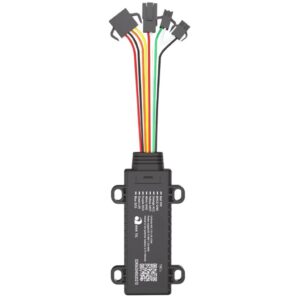The market for GPS tracker in the United States has many characteristics:
Market size and growth trend:
Large scale: The United States is one of the important GPS tracker markets in the world. In 2023, the global GPS tracker market will reach a certain level, and the United States will occupy a considerable share of it, and there are many companies and consumers using GPS tracker products and related services.
Stable growth: The GPS tracker market in the United States is expected to maintain a steady growth trend in the next few years. This is mainly due to growing demand, such as the increased demand for cargo tracking in the logistics industry, the continued need for individuals to locate vehicles and pets, and the emphasis on asset monitoring and management by enterprises.
Wide application areas:
Transportation and logistics: This is one of the main application areas of GPS tracker in the United States. Logistics companies use GPS tracker to track the location of vehicles and goods in real time, optimize transportation routes, improve transportation efficiency, and reduce transportation costs. For example, large logistics and transportation companies can install GPS tracker on vehicles to grasp the driving conditions of vehicles in real time, adjust transportation plans in time, and ensure that goods are delivered on time.
Automotive industry: The United States has a high car ownership rate, and consumers have a strong demand for car safety and anti-theft. GPS tracker are widely used in cars. On the one hand, automakers integrate GPS positioning systems into vehicles to provide consumers with navigation and vehicle positioning services; on the other hand, car owners also purchase independent GPS tracker for vehicle anti-theft and tracking.
Commercial and enterprise applications: Many companies use GPS tracker to manage and monitor the company’s vehicles, equipment and assets. For example, construction companies can use GPS tracker to track the location of engineering vehicles and equipment to improve equipment utilization and management efficiency; rental companies use GPS tracker to monitor the use of rental vehicles to prevent vehicle theft or abuse.
Personal and family applications: The demand for GPS tracker by individual users is also growing, which is used to track the location of pets, the elderly and children to ensure their safety. In addition, some outdoor sports enthusiasts also use GPS tracker to record movement trajectories and location information.
Fierce market competition:
Local companies have obvious competitive advantages: There are some well-known GPS tracker manufacturers in the United States, such as CalAmp, etc. These companies have strong competitiveness in technology research and development, product quality and brand influence. They not only occupy a large share of the US market, but also conduct business worldwide.
Active participation of international companies: In addition to local companies, GPS tracker companies in other countries in the world have also actively entered the US market, intensifying market competition. These international companies compete for US market share by providing competitive products and prices. For example, some companies from Asia have certain advantages in price and function, which poses a challenge to local US companies.
Technological development drives market development:
Development of high-precision positioning technology: With the continuous advancement of technology, the positioning accuracy of GPS tracker has been continuously improved, which can provide users with more accurate location information. For example, the application of differential GPS technology and multi-constellation satellite systems has enabled the positioning accuracy to reach the centimeter level, and has broad application prospects in some fields with high requirements for positioning accuracy, such as surveying and mapping, geological exploration, etc.
Integration with other technologies: The integration of GPS tracker with technologies such as the Internet of Things, cloud computing, and big data provides users with more intelligent services. For example, by connecting GPS tracker to the Internet of Things platform, users can realize remote monitoring and management of equipment and assets, and use big data analysis technology to analyze location data to provide support for corporate decision-making.
Impact of policies and regulations:
Data privacy and security regulations: The United States has strict regulatory requirements for data privacy and security. GPS tracker companies need to comply with relevant regulations to ensure that users’ location information and personal data are protected. This has increased the operating costs and technical difficulties of enterprises to a certain extent, but it has also promoted the healthy development of the industry.
Promotion of traffic regulations: The traffic regulations in the United States have certain requirements for vehicle safety and monitoring, which has also promoted the application of GPS tracker in the automotive industry. For example, some states require commercial vehicles to be equipped with GPS tracker so that regulatory authorities can monitor the driving conditions of the vehicles.




